How to Advocate for Yourself During a Hearing Test
A hearing test isn’t just something that happens to you while you

By: admin | October 20, 2025
A hearing test isn’t just something that happens to you while you sit quietly in a booth. It’s a conversation between you and your audiologist, and the information you share plays a critical role in getting results that truly reflect your hearing and your life. Many people assume they should simply follow instructions and let the audiologist do all the work, but your input matters more than you might think. You’re the only one who knows what situations give you trouble, whether you struggle more in noisy restaurants or during phone calls, and how your hearing challenges affect your daily routine. When you speak up about these experiences, you help your specialist understand the full picture of your hearing health rather than just the numbers from a test.
Being an active participant during your hearing test also means you’re more likely to leave the appointment feeling informed and confident about next steps. If something isn’t clear or you don’t understand why a certain test is being done, asking questions helps you stay engaged in your own care. If you’re unsure whether the results match what you’ve been experiencing, mentioning that discrepancy can lead to additional testing or a deeper conversation about your hearing patterns. The goal is to make sure any follow-up care, whether it’s monitoring your hearing over time or getting fitted for hearing aids, is based on a complete understanding of your needs and lifestyle.
Hearing loss develops when the structures in the ear or the pathways to the brain are no longer able to detect or process sound as effectively as they once could. It can occur gradually over time or appear more suddenly, depending on the cause. Age-related changes are one of the most common reasons for hearing loss. As we get older, tiny hair cells in the inner ear that convert sound vibrations into signals for the brain can wear down, making it harder to detect certain pitches, especially higher-frequency sounds.
Other factors can also contribute to hearing loss. Long-term exposure to loud noise, whether from work, recreational activities or frequent use of headphones at high volumes, can damage the delicate hair cells in the inner ear. Certain health conditions, medications or infections may affect the ear’s ability to process sound, and genetics can make some people more susceptible to hearing changes. Because these shifts often happen slowly, you might not notice them at first, but over time they can make it harder to follow conversations, enjoy music or hear important everyday sounds.
Hearing changes can be subtle, and many people do not notice them at first. You might find yourself asking others to repeat themselves more often or needing to turn up the volume on the TV, radio or phone. Difficulty following conversations in noisy environments, like restaurants or family gatherings, is another common sign. These challenges can make everyday interactions more tiring and frustrating, even if others around you do not notice a change.
Other signs can include ringing or buzzing in the ears, known as tinnitus, or a feeling of fullness or pressure in the ear. You might also notice that soft sounds, like a dripping faucet or birds outside, are harder to hear than they used to be. Missing phone calls, doorbells or alarms more frequently can indicate that your hearing is changing. Paying attention to these signs and scheduling a hearing test can help you understand what is happening and allow you to address changes early, before they begin to affect communication and daily life.
Before your hearing test, your audiologist will typically start by gathering important information about your hearing and overall health. You can expect to discuss any symptoms you have noticed, like difficulty following conversations, ringing or buzzing in the ears, or sensitivity to certain sounds. Providing details about when these issues began, how often they occur and what situations make them more noticeable helps your audiologist understand your unique hearing profile. Sharing your medical history, including past ear infections, surgeries, medications and any family history of hearing loss, is also important, as these factors can influence your hearing.
A physical examination of your ears is usually part of the pre-testing process. The audiologist will check for earwax buildup, signs of infection or structural issues that could affect hearing. This may involve using an otoscope to look inside the ear canal and assess the eardrum. Completing this examination ensures your ears are healthy and ready for testing, and helps identify any conditions that might need attention before further evaluation. Taking time to gather this information and complete the examination provides a clear foundation for accurate and effective hearing testing later.
Before your hearing appointment, it is helpful to write down any questions or concerns you have about your hearing or the testing process. It is easy to forget what you wanted to ask once you are in the clinic, and having a list ensures all your topics are addressed. Taking a few minutes to prepare can make you feel more confident, help you get the most out of your visit and make sure nothing important is overlooked when speaking with our team.
Thinking about your questions ahead of time also helps the appointment run more smoothly. You might want to ask about what types of tests will be performed, how long each part of the appointment will take or whether there are any steps you should take beforehand, like avoiding loud noise or cleaning your ears. Other helpful questions could include:
Having these questions ready not only gives you a better understanding of the testing process but also ensures you feel prepared to discuss your hearing needs and concerns openly.
Hearing loss can affect daily life in a variety of ways, often in ways you might not immediately notice. Simple activities like talking with friends, listening to family conversations, watching TV or following a podcast can become more challenging. Background noise in restaurants, classrooms or busy offices can make it particularly difficult to focus on speech, leading to missed information or repeated questions. Even brief interruptions in understanding can create frustration for both you and the people you are speaking with.
The effects of hearing loss extend beyond just conversations. You may notice that you have to strain to hear announcements in public spaces, miss alerts from doorbells or alarms, or struggle to follow instructions during work or daily tasks. Over time, these challenges can lead to social fatigue, where you might start avoiding group activities or gatherings because they feel overwhelming.
The hearing test process evaluates how well you hear different sounds, pitches and volumes. It usually starts with pure-tone audiometry, where you listen to a series of tones through headphones. You will indicate when you hear each tone, which helps the audiologist determine the quietest sounds you can detect at various frequencies for each ear.
Speech audiometry is another common test. During this, you will hear words or sentences through headphones or speakers and repeat them back. This measures not just your ability to hear speech but also how clearly you understand words in quiet and noisy environments.
Tympanometry may be used to test the movement of your eardrum and middle ear pressure. A small device creates slight changes in air pressure and records how your eardrum responds. This helps identify issues that affect sound transmission, like fluid or stiffness in the middle ear.
Some audiologists also conduct tests of the inner ear and auditory nerve. These can include measuring how your cochlea responds to certain sounds or how well your ears work together to locate where a sound is coming from. Together, these tests provide a complete picture of how your hearing functions, identifying which frequencies or types of sounds may be more difficult for you to detect.
During the hearing test itself, it is important to pay close attention to the instructions for each step. If a tone or word is unclear, ask the audiologist to repeat or explain it. Using the correct response method, whether pressing a button, raising your hand or repeating words, ensures the results reflect your actual hearing ability.
Respond honestly to what you hear. Only indicate a sound or word when you genuinely hear it, rather than guessing. If certain pitches or words are consistently difficult, mention this during the test. Providing accurate, real-time feedback allows the audiologist to adjust the testing or explore additional areas to get a complete picture of your hearing.
If you feel fatigued or overwhelmed, ask for a short break. Staying focused throughout the process helps maintain accurate results and reduces strain. Speaking up about discomfort, confusion or difficulty at any point ensures the testing is tailored to your needs and provides the most useful information for future hearing care.
When your hearing test is complete, the audiologist will review the results with you in detail. Take the time to ask questions and make sure you understand what each measurement means. Pointing out areas that feel most challenging in your daily life helps your audiologist interpret the results in a way that reflects your actual experiences.
As treatment options are discussed, including hearing aids or other interventions, speak up about your preferences and lifestyle needs. Share what environments are most important to you, like work, social settings or hobbies, so your options can be tailored accordingly. Asking for clarification on features, settings or expected outcomes ensures you are making informed choices.
Throughout this conversation, advocating for yourself means actively participating, sharing your perspective and confirming that the plan fits your needs. Your input helps your specialist design a strategy that works for you and supports your comfort, clarity and confidence in everyday listening situations.
Taking an active role in your hearing test helps ensure your care matches your needs. When you share what you notice in everyday situations, ask questions or let us know if something doesn’t make sense, it gives our audiologist the full scope of your health. This kind of open conversation makes the results more accurate and helps us find solutions that really work for your daily life.
If you have questions about preparing for a hearing test or would like more information, contact Hearing Wellness Centre in Windsor, ON. Our team is here to support you at every stage of the process. Call (844) 663-9433 for more information or to book an appointment. Your input matters and we look forward to working together for your hearing health.
Tags: speech tests, tympanometry

A hearing test isn’t just something that happens to you while you
By: admin | October 20, 2025

Summer is a time for outdoor barbecues, beach trips and long walks in the
By: admin | July 29, 2025

When you find yourself asking people to repeat themselves more frequently
By: admin | June 20, 2025
